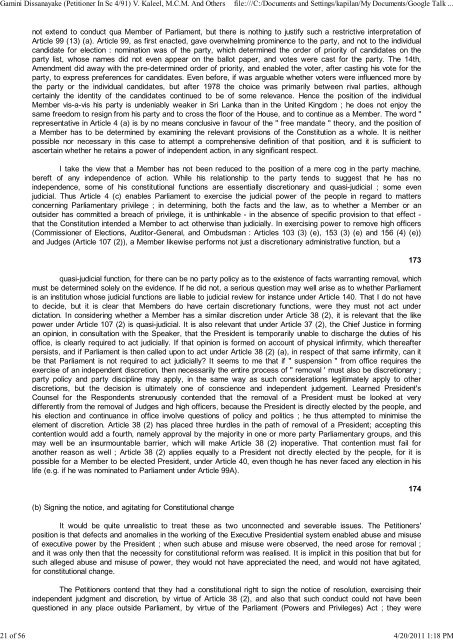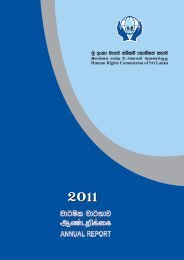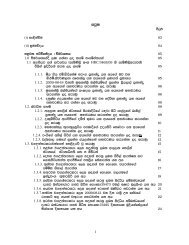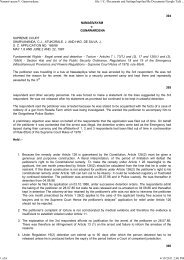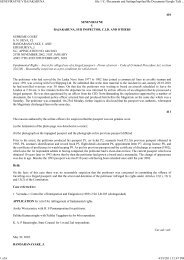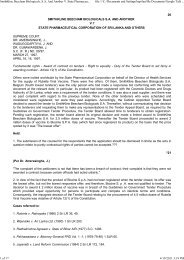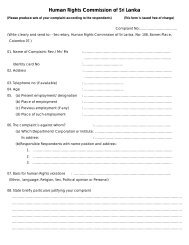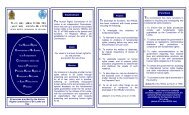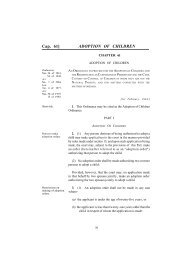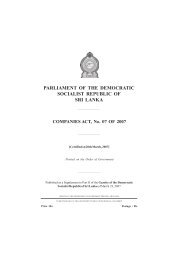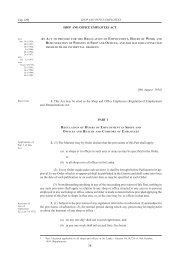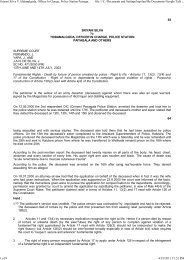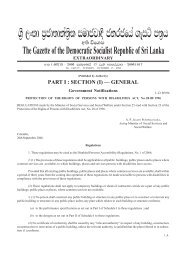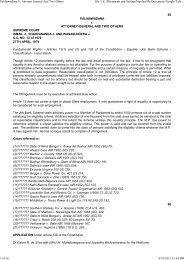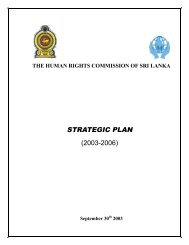Gamini Dissanayake (Petitio... - Human Rights Commission of Sri ...
Gamini Dissanayake (Petitio... - Human Rights Commission of Sri ...
Gamini Dissanayake (Petitio... - Human Rights Commission of Sri ...
Create successful ePaper yourself
Turn your PDF publications into a flip-book with our unique Google optimized e-Paper software.
<strong>Gamini</strong> <strong>Dissanayake</strong> (<strong>Petitio</strong>ner In Sc 4/91) V. Kaleel, M.C.M. And Others file:///C:/Documents and Settings/kapilan/My Documents/Google Talk ...<br />
not extend to conduct qua Member <strong>of</strong> Parliament, but there is nothing to justify such a restrictive interpretation <strong>of</strong><br />
Article 99 (13) (a). Article 99, as first enacted, gave overwhelming prominence to the party, and not to the individual<br />
candidate for election : nomination was <strong>of</strong> the party, which determined the order <strong>of</strong> priority <strong>of</strong> candidates on the<br />
party list, whose names did not even appear on the ballot paper, and votes were cast for the party. The 14th,<br />
Amendment did away with the pre-determined order <strong>of</strong> priority, and enabled the voter, after casting his vote for the<br />
party, to express preferences for candidates. Even before, if was arguable whether voters were influenced more by<br />
the party or the individual candidates, but after 1978 the choice was primarily between rival parties, although<br />
certainly the identity <strong>of</strong> the candidates continued to be <strong>of</strong> some relevance. Hence the position <strong>of</strong> the individual<br />
Member vis-a-vis his party is undeniably weaker in <strong>Sri</strong> Lanka than in the United Kingdom ; he does not enjoy the<br />
same freedom to resign from his party and to cross the floor <strong>of</strong> the House, and to continue as a Member. The word "<br />
representative in Article 4 (a) is by no means conclusive in favour <strong>of</strong> the " free mandate " theory, and the position <strong>of</strong><br />
a Member has to be determined by examining the relevant provisions <strong>of</strong> the Constitution as a whole. It is neither<br />
possible nor necessary in this case to attempt a comprehensive definition <strong>of</strong> that position, and it is sufficient to<br />
ascertain whether he retains a power <strong>of</strong> independent action, in any significant respect.<br />
I take the view that a Member has not been reduced to the position <strong>of</strong> a mere cog in the party machine,<br />
bereft <strong>of</strong> any independence <strong>of</strong> action. While his relationship to the party tends to suggest that he has no<br />
independence, some <strong>of</strong> his constitutional functions are essentially discretionary and quasi-judicial ; some even<br />
judicial. Thus Article 4 (c) enables Parliament to exercise the judicial power <strong>of</strong> the people in regard to matters<br />
concerning Parliamentary privilege ; in determining, both the facts and the law, as to whether a Member or an<br />
outsider has committed a breach <strong>of</strong> privilege, it is unthinkable - in the absence <strong>of</strong> specific provision to that effect -<br />
that the Constitution intended a Member to act otherwise than judicially. In exercising power to remove high <strong>of</strong>ficers<br />
(<strong>Commission</strong>er <strong>of</strong> Elections, Auditor-General, and Ombudsman : Articles 103 (3) (e), 153 (3) (e) and 156 (4) (e))<br />
and Judges (Article 107 (2)), a Member likewise performs not just a discretionary administrative function, but a<br />
quasi-judicial function, for there can be no party policy as to the existence <strong>of</strong> facts warranting removal, which<br />
must be determined solely on the evidence. If he did not, a serious question may well arise as to whether Parliament<br />
is an institution whose judicial functions are liable to judicial review for instance under Article 140. That I do not have<br />
to decide, but it is clear that Members do have certain discretionary functions, were they must not act under<br />
dictation. In considering whether a Member has a similar discretion under Article 38 (2), it is relevant that the like<br />
power under Article 107 (2) is quasi-judicial. It is also relevant that under Article 37 (2), the Chief Justice in forming<br />
an opinion, in consultation with the Speaker, that the President is temporarily unable to discharge the duties <strong>of</strong> his<br />
<strong>of</strong>fice, is clearly required to act judicially. If that opinion is formed on account <strong>of</strong> physical infirmity, which thereafter<br />
persists, and if Parliament is then called upon to act under Article 38 (2) (a), in respect <strong>of</strong> that same infirmity, can it<br />
be that Parliament is not required to act judicially? It seems to me that if " suspension " from <strong>of</strong>fice requires the<br />
exercise <strong>of</strong> an independent discretion, then necessarily the entire process <strong>of</strong> " removal ' must also be discretionary ;<br />
party policy and party discipline may apply, in the same way as such considerations legitimately apply to other<br />
discretions, but the decision is ultimately one <strong>of</strong> conscience and independent judgement. Learned President's<br />
Counsel for the Respondents strenuously contended that the removal <strong>of</strong> a President must be looked at very<br />
differently from the removal <strong>of</strong> Judges and high <strong>of</strong>ficers, because the President is directly elected by the people, and<br />
his election and continuance in <strong>of</strong>fice involve questions <strong>of</strong> policy and politics ; he thus attempted to minimise the<br />
element <strong>of</strong> discretion. Article 38 (2) has placed three hurdles in the path <strong>of</strong> removal <strong>of</strong> a President; accepting this<br />
contention would add a fourth, namely approval by the majority in one or more party Parliamentary groups, and this<br />
may well be an insurmountable barrier, which will make Article 38 (2) inoperative. That contention must fail for<br />
another reason as well ; Article 38 (2) applies equally to a President not directly elected by the people, for it is<br />
possible for a Member to be elected President, under Article 40, even though he has never faced any election in his<br />
life (e.g. if he was nominated to Parliament under Article 99A).<br />
(b) Signing the notice, and agitating for Constitutional change<br />
It would be quite unrealistic to treat these as two unconnected and severable issues. The <strong>Petitio</strong>ners'<br />
position is that defects and anomalies in the working <strong>of</strong> the Executive Presidential system enabled abuse and misuse<br />
<strong>of</strong> executive power by the President ; when such abuse and misuse were observed, the need arose for removal ;<br />
and it was only then that the necessity for constitutional reform was realised. It is implicit in this position that but for<br />
such alleged abuse and misuse <strong>of</strong> power, they would not have appreciated the need, and would not have agitated,<br />
for constitutional change.<br />
The <strong>Petitio</strong>ners contend that they had a constitutional right to sign the notice <strong>of</strong> resolution, exercising their<br />
independent judgment and discretion, by virtue <strong>of</strong> Article 38 (2), and also that such conduct could not have been<br />
questioned in any place outside Parliament, by virtue <strong>of</strong> the Parliament (Powers and Privileges) Act ; they were<br />
21 <strong>of</strong> 56 4/20/2011 1:18 PM<br />
173<br />
174


